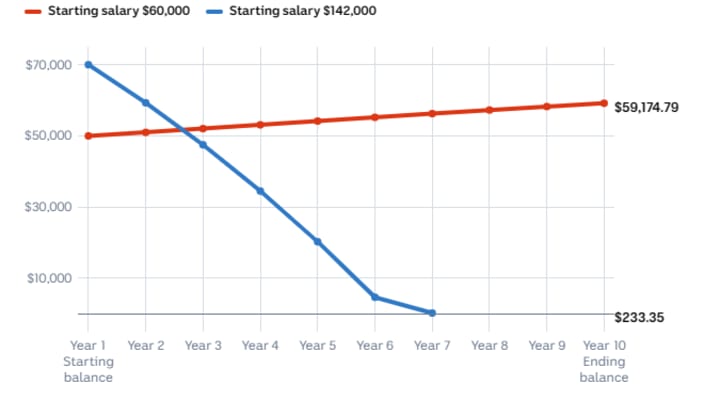Financial Freedom over Career Flexibility
Shift in Ambition

The Changing Educational Landscape
The educational landscape is evolving, with trade schools and vocational programs gaining popularity, especially among Generation Z. These practical demographic values targeted knowledge and industry certifications that directly lead to lucrative career opportunities, diverging from the theoretical approach of traditional colleges.
While some critics may question their ambitions, Gen Z has reshaped the definition of success by emphasizing financial independence and job flexibility.
Some may dismiss these choices as indicative of “lowered” ambitions; however, Generation Z is redefining ambition altogether.
By prioritizing financial freedom and career flexibility, they are challenging conventional notions of success.

This shift reflects a forward-thinking approach to education, emphasizing practical skills and real-world applications that equip individuals to thrive in an ever-changing landscape.
The Shift in Ambitions
For decades, society has placed a high premium on a four-year college degree as the ultimate symbol of success. However, Gen Z sees things differently. They recognize that taking on massive student debt is not a prerequisite for a successful career. Instead, they value practical skills and hands-on training that can lead to well-paying, stable jobs.
Instead of viewing large debt as a hallmark of success, Generation Z has opted to sidestep unnecessary credentialism. They prioritize educational pathways that lead directly to meaningful and sustainable careers without the financial burdens traditionally associated with higher education.
This strategic choice enables them to enter the workforce equipped with practical skills and expertise, challenging long-held assumptions about the relationship between education and success.
The shift in ambition from pursuing traditional college degrees to enrolling in trade schools and vocational programs is notable among Generation Z.
Here are some key statistics that highlight this trend:
Enrollment Increase: Enrollment in vocational programs has jumped by 16% in the past year. This significant rise underscores the growing preference for practical, skills-based education.
Shift to Trade Jobs: There has been a 23% increase in students opting for construction jobs and other trades post-high school. This move reflects a strategic choice for careers that offer stability and high wages without the burden of student debt.
Straight Path to High Earnings: Many Gen Z individuals are choosing trade schools over college because professions such as welding, and carpentry provide a direct route to six-figure salaries. This pragmatic approach aligns with their desire for financial security and career flexibility.
Industry Revitalization: The increased interest in trade and technical jobs is not only shaping individual career paths but also revitalizing industries that have long been overlooked. These sectors are essential and often resistant to outsourcing, making them attractive options for a reliable career.
The Financial Reality
The financial burden of a traditional college education is staggering. With the average bachelor’s degree costing well over $100,000, many graduates find themselves entering the workforce with a mountain of debt. In contrast, trade schools offer a much more affordable path.
Most vocational programs can be completed in one to two years at a fraction of the cost. This lower barrier to entry leaves Gen Z with more financial freedom and the ability to invest in other important aspects of life.
Why should they invest over $100,000 that they likely don’t possess into a path growing increasingly uncertain? Gen Z has realized that the once unquestioned conveyor belts their predecessors embarked on may no longer be the wise choice it appeared to be.
Needless to say, that my 16-year-old singer-songwriter daughter earned more per hour than I did, despite my multiple undergraduate degrees and prestigious master’s degree.
In Australia, the average time it takes to fully repay an education debt under the Higher Education Loan Program (HELP) is approximately 9.5 years. This duration has been increasing over the years, reflecting broader economic trends and rising educational costs.
And here is more confronting news: in Australia female university graduates have bigger HECS debts but earning less than men, as research reveals.
The Futurity Investment Group’s university debt report, which surveyed more than 1,000 Australian graduates, found 70% of males earned more than $60,000, compared with 59% of women. Men were also more likely to be earning more than $100,000 (35% compared with 21% of women).
At the same time, nearly half (46%) of female graduates finished university with a HECS (Higher Education Contribution Scheme) or HELP (Higher Education Loan Program) debt of between $20,000 — $50,000, a rise of 14% in three years and slightly higher than men (43%).
True face of the lack of “gender equality” dominating our passage of right to corporate careers.
Some graduates complete their repayments in as few as five to six years, particularly those with higher incomes or more aggressive repayment strategies. However, for many, the timeline extends as they navigate varying financial circumstances and the impact of interest and indexation on their debt balances.
For context, this is relatively shorter compared to some other countries, such as the United States, where the average repayment period can range from 17 to 20 years or more. The differences highlight the unique financial structures and policies impacting student debt repayment timelines globally.
Post graduation outlook is equally grim. The journey for young graduate-interns in the professional services industry is indeed a challenging one. They often find themselves navigating long hours and demanding roles to kickstart their careers, all while battling the rigors of completing their professional qualifications.
In occupations like mine, accounting, the path to becoming a Certified Practicing Accountant (CPA) in Australia can take approximately 5 to 7 years. During this period, many interns earn minimal wages, particularly within the Big Four auditing firms.
This dual burden of extensive work commitments and rigorous study schedules places immense pressure on young professionals. The demanding environment can lead to significant stress and burnout, raising critical questions about the sustainability and ethics of such employment practices.
Here is what HECS looks when you are barely earning 60,000 per annum in professional services as opposed to decent 142,000. If you earn 60,000 your HECS debt not only does not get repaid but it increases from 50,000 AUD to 59,174 AUD thanks to CPI indexation in 10 years.

Real-World Relevance
The practical benefits of skills-based education cannot be overstated. Trade schools provide targeted training for specific careers, ensuring that graduates are job-ready from day one. In essential sectors such as healthcare, plumbing, and electrical work, skilled tradespeople are always in demand. These jobs offer stability and a reliable income, disconnected from the peaks and troughs of the corporate cycle.
By focusing on practical skills and real-world applications, trade schools empower individuals to achieve financial security and career fulfillment. This approach positions them well for success in an evolving landscape where specialized knowledge and hands-on expertise are increasingly valued.
Besides, the bulk of corporate jobs has increasingly become vulnerable to digitalization and automation due to rapid advancements in artificial intelligence (AI). Industries across various sectors are witnessing a transformative shift as AI technologies streamline processes, enhance efficiency, and reduce operational costs.
This evolution presents both challenges and opportunities. On one hand, roles that involve routine, repetitive tasks are at risk of displacement. Positions in data entry, customer service, and basic administrative functions are particularly susceptible to automation.
This trend underscores the necessity for professionals to adapt, upskill, and embrace new competencies that leverage human creativity, critical thinking, and emotional intelligence — capabilities that AI cannot replicate.
Navigating this landscape requires a forward-thinking approach, where continuous learning and adaptability are paramount. As AI continues to reshape the corporate environment, professionals and organizations alike must proactively engage with these advancements to harness their full potential, ensuring sustainable growth and resilience in an ever-evolving marketplace.
The Value of Choice
While trade schools offer numerous advantages, it’s essential to recognize that traditional college education still holds value for many.
For careers in fields like engineering, medicine, and law, a college degree is indispensable. The key is to advocate for a balanced approach to education. We should appreciate the merits of both college and vocational programs, understanding that different paths suit different individuals.
We must appreciate the merits of both college and vocational programs, recognizing that different paths are suited to different individuals.
By understanding and valuing the diverse educational routes available, we can better equip future generations with the tools and insights needed for success in an evolving landscape. This balanced perspective ensures that we support each individual’s unique journey toward professional fulfillment and societal contribution.
In short, an open-minded examination of Gen Z’s educational choices reveals a potential revolutionary shift in how we conceptualize success. By valuing financial freedom, practical skills, and career flexibility, Gen Z is challenging the status quo and paving the way for a new understanding of ambition and achievement.
I can personally attest to this shift. Despite having multiple degrees and over 20 years of experience, I earn as much as a fresh tradesman. This reality underscores the value of vocational education and the importance of recognizing its place alongside traditional college paths.
Let’s look at Gen Z’s boldness in the face of economic headwinds as a clear path forward. It’s time to move beyond our biases and appreciate the diverse ways in which young people today are redefining success.
If you’re considering your educational path or rethinking your career trajectory, remember this — success doesn’t have one definition, and neither should education.
Truly Yours
Narghiza Ergashova
Redefining the Hunt for Talent: Smart Contracting's Revolutionary Role (marketersmedia.com)
https://news.marketersmedia.com/redefining-the-hunt-for-talent-smart-contractings-revolutionary-role/89120496
-----
About the Creator
Narghiza Ergashova
Finance Executive.Strong negotiator focused on achieving win-win outcomes. Expert in building effective relationships with stakeholders. Personable, articulate, highly motivated individual with a focus on achieving business objectives.
Enjoyed the story? Support the Creator.
Subscribe for free to receive all their stories in your feed. You could also pledge your support or give them a one-off tip, letting them know you appreciate their work.






Comments (1)
Thanks for sharing it.